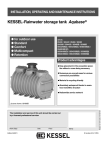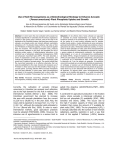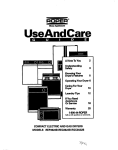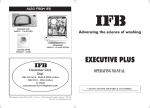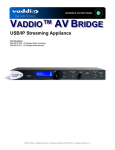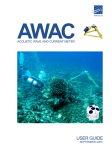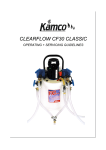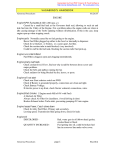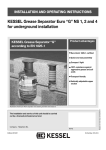Download KESSEL septic systems - INNO
Transcript
INSTALLATION AND OPERATING INSTRUCTIONS KESSEL septic systems - INNO-CLEAN® - the complete biological septic system for cleaning domestic wastewater in keeping with DIN 4261 Part II/EN 12566 General construction supervisory approval: Z-55.3-85 • • • • • INNO CLEAN EW4 EW 6 EW 8 Single tank systems For burying in the ground Art. No.: 97600 / 97610 / 97620 Product Advantages Low costs of maintenance Long service life and water seal tightness thanks to seamless monolithic construction High degree of resistance to corrosive wastewater Easy installation due to low weight Special materials make it shatterproof Recyclable he installation and service of this unit should be carried out by a licensed professional servicer Company - Telephone No. Edition 09/2005-HG (Subject to technical amendments) ID number 010-693 4) / 85445/80B(D) / 85460/80B(D) (D) / 85545/80B(D) / 85560B( Dear Customer, Before the KESSEL - INNO-CLEAN® septic system is installed and placed in operation please carefully read and follow all of the instructions contained in this Installation, Maintenance and User's Manual. Upon delivery of the septic system please thoroughly inspect it to make sure that it has not been damaged during shipping. In case damage has occurred to the separator, please follow the instructions listed in the ‚Guarantee section of this user's manual. KESSEL GmbH 2 Table of Contents 1. Safety instructions Page 4 2. General 2.1 Area of use 2.2 Description of system 2.3 Functional description Page 5 Page 5 Page 6 3. Packing, transport and storage 3.1 Packing 3.2 Transport 3.3 Storage Page 8 Page 8 Page 8 4. Installation and mounting 4.1 Overview of installation steps 4.2 Tank installation 4.2.1 Backfilling material 4.2.2 Pit 4.2.3 Tests prior to installation 4.2.4 Installation 4.2.5 Fitting the attachments 4.3 Control unit installation 4.3.1 Fitting the control system and compressor 4.3.2 Connecting the control unit to the aeration hoses Page 9 Page 9 Page 9 Page 9 Page 10 Page 10 Page 11 Page 12 Page 12 Page 13 5. Start-up 5.1 Ensuring proper functioning of system 5.2 Briefing / Hand-over Page 21 Page 21 6. Operation and waste disposal 6.1 Operation 6.2 Operator's own checks 6.3 Waste disposal instructions 6.4 Waste disposal Page 22 Page 22 Page 24 Page 25 7. Maintenance Page 26 8. Specifications 8.1 Dimensional drawing 8.2 Cleansing figures and power consumption Page 26 Page 27 9. Control of the septic system 9.1 Messages of the control unit 9.2 Menu guide Page 28 Page 30 10. Malfunctions and remedial steps 11. Guarantee 12. Septic system characteristics 13. Important contacts / info Page 32 Page 33 Page 34 Page 35 3 1. Safety instructions The personnel for installation, operation, maintenance and repair must have the appropriate qualifications for this work. The operator is to precisely regulate responsibility, the field of responsibility and supervision of personnel. The operational reliability of the supplied system is only ensured given use as conforming to purpose On no account are standards associated with the specifications to be fallen short of. This system is provided with electrical voltages and controls mechanical system parts. Non-observance of the operating instructions could result in considerable material damage, injuries or terminal accidents. The accident prevention provisions and appropriate DIN/VDE standards and directives are to be followed when installing, operating, maintaining and repairing the system. These include: • "Accident prevention provisions – construction work" BGV C22, up to now VBG 37 • "Pits and ditches, slopes, working area width, trench shoring" DIN 4124 • "Laying and testing wastewater lines and channels" DIN EN 1610 • "Directives for working in tanks and confined spaces" BGR 117 – up to now ZH1/77 • Directives of the local energy supply concerns are to be observed. The access cover of the septic system must be satisfactorily secured against unauthorised opening (especially by children) - even during breaks from work. Warning The system is made up of a number of components. Therefore consult the individual chapters in the operating instructions. Only when the complete system is shut down by pulling out the mains plug at the control unit and secured against being turned on again is any component to be installed, maintained, inspected or repaired. The control unit is under voltage and must not be opened. Only electrical specialists are allowed to work on electrical equipment. The electrical specialist term is defined in VDE 0105. Work on the air compressor going beyond that described in the inspection and maintenance chapter is not allowed. It is to be ensured that the electrical wiring and all other electrical system parts are in good working order. Under no circumstances is the system to be started if damage is present. Please note ! The system may only be updated or modified in consultation with the manufacturer. The purpose of genuine spare parts and manufacturer-approved accessories is to uphold safety. Use of other parts can nullify the liability for the resulting consequences. 4 2. General 2.1 Area of use INNO-CLEAN®, the septic system from KESSEL, is a cleaning unit for domestic wastewater in keeping with DIN 4261 Part II / EN 12566. It is not envisaged for precipitation and animal husbandry and swimming pool wastewater. This septic system biologically cleans domestic wastewater and automatically adapts to the quantities arising. The wastewater is collected and cleaned in a plastic tank. This tank is envisaged for trench shoring in the ground. A control unit automatically regulates aeration and agitation. It is envisaged for unobstructed installation in frost-protected, dry rooms which are safeguarded from flooding. In addition to the septic system, provision must be made for a suitable wastewater discharge line in keeping with ATVDVWK –A138. Furthermore, the council, country district or district water authority is responsible for installation and operation approval. 2.2 Description of system KESSEL-INNO-CLEAN® consists of two principal segments. The control unit is in a frost-free, dry room safeguarded from flooding; the plastic tank housing the cleansing process is buried in the ground. 1. Control unit (controller and air compressor) 2. Inlet 3. KESSEL-INNO-CLEAN® tank 4. Load-class B (12.5 ton) cast iron covers (child-proof) 5. KESSEL-INNO-CLEAN® activation system 6. Pre-septic chamber 7. Separation wall 8. Activation chamber 9. Sampling chamber 10. Well drain (optional) 5 2. General 2.3 Functional description Cleansing is automatically carried out by the control unit. A cleansing cycle lasts some 8 hours and is ended with the cleansed water being discharged. The next cleansing process is automatically started given enough wastewater in the pre-cleansing chamber. Cleansing is based on microorgansims which clean the wastewater during the treatment phase. A lack of oxygen arises between the aeration phases thus forcing the microorganic culture to continue the metabolism in the anaerobic range. The altered metabolism results in nitrate and nitrite decomposing into harmless gaseous nitrogen (denitrification). This treatment phase lasts for six hours. 1. Feeding-in the black wastewater (all the domestic wastewater) All domestic wastewater gets into the pre-cleansing chamber. The solids settle to the bottom and form a sludge layer. 2. Filling the activation chamber The activation chamber is filled with the wastewater from the pre-cleansing chamber. The wastewater sludge remains in the pre-cleansing chamber, is compressed and must be disposed of once maximum capacity has been reached. 6 2. General 3. Wastewater treatment phase Short aerator surges stir up the wastewater in the activation chamber. Oxygen gets into the wastewater due to phased aeration and microorganisms explode in number. During aeration the metabolism of the microorganisms cleans the wastewater of ammonium, iron, manganese and organic compounds. 4. Settling phase A two-hour settling phase follows the treatment phase. All the solids in the wastewater can settle and a sludge layer of microorganisms forms at the bottom. 5. Discharging the clear water The cleansed water remaining above this sludge layer is automatically drained. At the same time, the sludge layer is pumped from the bottom of the cleansing chamber into the pre-cleansing chamber. 7 3. Transport and Storage 3.1 Transport Transportation of the KESSEL separator should be handled only by a transporter who has the proper knowledge, equipment and employees to handle such a product. During transport the separator must be firmly fixed into position and must not be allowed to move or shift in place. It also must be protected from other objects coming in contact with the separator during transport. If and when the separator is lifted it is important to follow the following correct procedures: The separator is not to be lifted with the use of steel cables or chains. Proper equipment are heavy duty cloth or hemp straps designed to handle the corresponding loads. The separator should be lifted by placing the proper straps beneath the inlet and outlet of the separator as seen in the illustration. Do not lift the separator by the small holes between the two manholes covers as illustrated on this page. In instances where a forklift is used, secure the separator to the forklift with appropriate cloth / hemp securing straps. 3.2 Storage In cases where the separator needs to be temporarily stored before installation, it is important that the separator is placed on firm level ground and in an area where it is protected from coming in contact with other objects. Storing the separator outdoors will not cause any problems. 8 4. Installation and mounting When temporarily storing the septic system and up the end of installation, appropriate protective steps must be initiated at the site to prevent accidents as well as damage to the septic system. Notice is to be taken of the chapter on safety instructions. 4.1 Overview of installation steps 1. Dimension float switch cable and aeration hose and determine where the pit is to be positioned. 2. Excavate the pit. 3. Fill with earth gravel, draw off horizontally and shake. 4. Transfer tank into the pit. 5. Piping of supply and discharge. 6. Install aeration hoses and float switch cable in a DN 150 empty tube. 7. Mount and connect air compressor and control unit 8. Fill tank with water (water up to the underside of the supply and drain pipe) 9. Backfill tank with gravel and compact (up to under the drain) 10. Put on attachments and fix clamping ring. 11. Backfill the top layer in keeping with use wanted. 12. Mount access covers on the shafts. 13. Start-up of system. 4.2 Tank installation Installation requirements Installation is only to be done by firms with technical experience, suitable equipment and trained personnel. Ground characteristics in terms of construction suitability must be recorded (ground classification for construction purposes - DIN 18196). The maximum ground water level must also be established before construction work begins. It is vital in the case of impermeable soils for an adequate drainage of seepage. The types of load arising such as max. traffic loads and installation depths must be clarified. 4.2.1 Backfilling material Foundation: rounded gravel (max. grain 8/16) in keeping with DIN 4226-1 Tank bed: Sand Tank surrounds: rounded gravel (max. grain 8/16) in keeping with DIN 4226-1 Area beyond tank surrounds: material of a suitable composition Top layer: humus or similar 4.2.2 Pit The pit bottom must be horizontal and level allowing the full system surface to be set up. In addition, the subsoil must guarantee an adequate degree of load bearing. For the foundation, compacted rounded gravel (max. grain 8/16, thickness min. 30 cm, Dpr=95%) is needed and on top of this 3 – 10 cm of compacted sand. There must be a gap of at least 70 cm between pit wall and tank. Slopes must be in keeping with DIN 4124. • Installation on slopes When installing the septic system on a slope, the lateral earth thrust in the case of non-structured soil must be absorbed by an appropriately designed retaining wall. • Frost-free depth given all-year round use Note the local frost-free depth when installing the septic system. To ensure trouble-free operations in winter, the supply and drain pipes are also to be laid at a frost-free installation depth. If not otherwise stipulated by the public authority, the frost-free depth is approx. 80 cm. 9 4. Installation and mounting 4.2.3 Tests before installation Just before inserting the tank in the pit, the specialist of the company charged with installation is to check and attest to the following: - The intactness of the tank wall; - Proper state of the pit especially in terms of dimensions and bottom bed; - Grain property of the back-fill material. 1. Foundation: rounded gravel (max. grain 8/16) in keeping with DIN 4226-1 compacted at Dpi=95% 2. Tank bed: compacted sand 3. Grease precipitator 4. Tank surrounds: rounded gravel (max. grain 8/16) in keeping with DIN 4226-1 compacted at Dpi=95% 5. Area beyond tank surrounds: material of suitable composition 6. Top layer: humus, tarmac, concrete or things similar 4.2.4 Installation Before pit excavation it must be ensured that the enclosed connection cables and hoses are a maximum 15 m in length. For this reason the connection between control unit and tank must be a maximum 12.5 m. • Insertion A suitable mechanism is to be used to position the tank in the pit in an impact-free manner and place it on the bottom bed (also see "Transport" chapter) • Casing the cables to the control unit During earthworks lay the connecting cable enclosed - preferably by means of a DIN 150 empty tube - to the control unit. • Tank connection The supply/drain lines and connecting lines are to be laid at a frost-free level and connected. A venting device (preferably via cap and min. DN 50) is to be allowed for. • Pit backfilling The tank surrounds must be of a minimum 50 cm width. None of the layers is to be in excess of 30 cm. Lightweight compacters (min. Dpr=95%) are to compact them. There must be no damage to the tank wall or any tank shifting during and following installation. KESSEL can provide a related shuttering and reinforcement plan. • Fill tank Fill the tank with water up to the drain. 10 4. Installation and mounting 4.2.5 Fitting the attachments • Insert telescopic KESSEL attachment into the tank opening and position as wanted. Now use the clamping ring to fix the attachment in the position wanted (alignment at the top ground surface). Use the set screws for precise trimming to final height. The continuously height-adjustable and inclinable attachment enables any ground inclinations to be easily offset. Finally adequately back fill the attachment and compact. Insert seal (Art. No. 860114). Grease lip seal, insert attachment, bring to roughly the installation height wanted and fix with clamping ring (Art. No. 860129). Use set screws for precise trimming to final height. 11 4. Installation and mounting 4.3 Control unit installation Note that empty tubes (DN 150) are to be laid for the connecting cables from the tank to the control unit. 1 = Air compressor 2 = Control Steps: Fitting the control and air compressor See Figs. on Pages 12 - 14 Fit control and air compressor in a frost-proof, dry room which is safeguarded from flooding. The air compressor must be above the control unit to avoid any damage. 1. The air compressor hose must be aligned and connected in a flush manner to the envisaged connection at the control. 2. The air compressor power cable is shortened as needed and provided with a special plug. Please note following plug connection allocation! Plug pole 1 - Phase Plug pole 2 - Neutral Plug pole 3 – PE conductor 3. Plugging in the power cable starts the septic system. ATTENTION Only place the system in operation once installation is complete. 12 4. Installation and mounting Connection of the control unit to the tank aeration hoses See Figs. on Pages 15 - 17 1. Enclosed with the tank is a 50m long hose (aeration hose) and a 15m long cable. Both of them are already mounted in the tank. 2. The distance between tank and control unit is measured and the aeration hose is adjusted to the distance to the control unit and cut. The part remaining is split into two equally long pieces. Please ensure that the hoses have an approx. maximum 15 m length. 3. The three aeration hoses are attached to the control unit as shown on Pages 12 – 14. 4. Shorten float switch cable as is needed, put on the special plug and connect to the control unit. (See Page 15). Please note following plug connection allocation: Plug pole 2 - Neutral Plug pole 3 – PE conductor Plug pole 4 – Signal 13 Fitting the control and air compressor Please cut off and use a portion of the included air hose in order to connect the compressor´s air output to the air intake of the control unit. 14 Fitting the control and air compressor 15 Fitting the control and air compressor 16 Connecting the control unit to the cleansing tank Connecting the control unit to the tank Aeration hoses Fig 1 17 Connecting the control unit to the cleansing tank Connecting the control unit to the tank Aeration hoses Fig 2 18 Connecting the control unit to the cleansing tank Connecting the control unit to the tank Aeration hoses Fig 3 19 4. Installation and mounting • Connecting the control unit to the tank Float switch lever – Fig 4 20 5. Start-up Take note of the chapter on safety instructions. 5.1 Ensuring proper functioning of system - The system is to be completely cleaned (including intakes and drains); solids and coarse materials are to be removed. - The cleaned system is to be filled with water up to around 10 cm under the prefabricated intake nozzle (see diagram). 5.2 Briefing / Hand-over A specialist company or a KESSEL representative is to carry out start-up and briefing (for an extra charge). 1. The following people should be present at hand-over: - Acceptance inspection representative of the owner - Specialist company We would also recommend the attendance of the - Operating personnel / operator - Waste disposal company 2. Preparation of a briefing and handover: - Sanitary fitting must be carried out - Operational filling of the system with water 3. Briefing: - Checking the system as to seal tightness, transport and mounting damage and checking line connections - Information on waste disposal (extraction) - Practical demonstration of operations 4. Handing over the installation and operating instructions 5. Preparation of the hand-over written record. (see Chapter 13) The system is to be returned to an operational state once the briefing is over. 21 6. Operation and waste disposal 6.1 Operation An active sludge layer with microorganisms forms in the pre-cleansing chamber 3-6 months after system start-up. No microorganisms need to be supplied to this system. The septic system operates fully automatically. Control automatically regulates adjustment to various wastewater quantities. It is vital that the maintenance intervals are kept to for smooth operations. It must be ensured that the pre-cleansing chamber is emptied in good time. 6.2 Operator's own checks As the septic system operator, you have a commitment to the water authority to ensure that the system runs smoothly. Malfunctions in biological septic systems nearly always impact negatively on the discharge quality of the cleaned water. They must therefore be spotted straightaway and put right by yourself or a first-rate maintenance company. To document your own checks you are obliged to keep an operating diary. This manual has a copy at the end with all the requirements needed. The water authority can request an insight into this operating diary. You are called upon to undertake the following regular checks. DAILY • Function of the control unit and checking on any unusual indications WEEKLY • Transferring the display operating times into the operating diary • Visual check as to thorough mixing and air bubble charging • Checking the water level in the pre-cleansing chamber. No sludge is to get into the activation chamber in a non-controlled manner. The sludge must be disposed of when a maximum 70% of the capacity is reached. The sludge layer is checked in a similar way as when checking vehicle oil levels. Take a long rod or something similar. This is dipped into the pre-cleansing chamber down to the tank bottom. The measuring instrument is then taken out of the tank and the thickness of the sludge layer measured. The following filling levels represent approx. 70% of max. capacity. Art. No.: 97600 97610 97620 Filling level 80 cm 95 cm 95 cm 22 6. Operation and waste disposal MONTHLY • Visual check of the run-off water as to clearness By keeping to the following recommendations you can save on unnecessary repair costs and raise the service life of the system. • The system must be permanently on – even when you are away on holiday • Extraneous water such as rainwater, ground water, swimming pool water and aquarium water is not to be brought in. Make sure that household cleaners have no acidic or alkaline reactions. The aeration ports as well as supply and drain openings must always be clear. There must be no difficulty in opening the system access covers. • See to it that a specialist company maintains the system at regular intervals. • Only the pre-cleansing chamber is to be regularly (approx. every 6 months) de-sludged by a waste disposal firm! This can also be done in line with needs following consultation with the water authorities responsible and conclusion of a maintenance agreement. 23 6. Operation and waste disposal 6.3 Waste disposal hints It is in your own interest to make a note of the following disposal hints: Solids or liquids that should not be put down the drain or toilet What they cause Where they can be stored Ash Condoms Chemicals Disinfectants Paints Photo chemicals Frying pan fat is non-decomposable clogging contaminate wastewater kill bacteria contaminate wastewater contaminates wastewater is deposited in pipes and this leads to clogging clog the pipes clogs the pipes are deposited in the system are deposited in the system contaminate wastewater contaminate wastewater contaminates wastewater rubbish bin rubbish bin waste collection points do not use waste collection points waste collection points Adhesive plasters Cat litter Cigarette ends Corks Lacquers Medicines Engine oil Oily waste Ear plugs Pesticides Paint brush cleaners Cleaning agents Razor blades Pipe cleaners Insecticides Tampons Cooking oil Meal left-overs Wallpaper paste Textiles (e.g. nylons, cleaning rags, hankies) Paint thinners Bird sand WC scale Nappies contaminates wastewater clog the septic system contaminate wastewater contaminate wastewater contaminate wastewater clog the septic system, risk of injury contaminate wastewater, pipe scale contaminate wastewater clog the septic system clogs the septic system clog the septic system clogs the septic system clog the septic system contaminate wastewater clogs septic system contaminates wastewater clog septic system rubbish bin rubbish bin rubbish bin rubbish bin rubbish bin waste collection points waste collection points, chemists waste collection points, petrol stations waste collection points rubbish bin waste collection points waste collection points waste collection points rubbish bin do not use waste collection points rubbish bin rubbish bin / waste collection points rubbish bin waste collection points second-hand clothing collections, rubbish bin waste collection points rubbish bin do not use rubbish bin 24 6. Operation and waste disposal 6.4 Waste disposal Emptying intervals: Unless otherwise laid down, the following emptying intervals apply for the sludge (from the preseptic chamber): Given 70% of the capacity of the septic system – but at least every six months. Caution: Correct functioning is only ensured by timely system waste disposal. That is why a waste disposal contract should be finalized with a specialist company. The waste disposal work is preferably to be carried out when there is no operation. CAUTION: Please refer to the pictures in the tank openings. Disposal No disposal Carrying out waste disposal Sludge collects in the pre-septic chamber and must be disposed of. But a sufficient quantity is to remain in the pre-septic chamber as the sludge contains the required microorganisms. Use the lifting spanner to slacken and detach the bolts and also to lift up and put down the shaft cover. • Slacken bolts. Take off shaft cover • Empty the sludge trap and pre-septic chamber with the suction spout of the waste disposal vehicle. • Clean tank walls. • Fill tank with water. • Clean and check on the shaft cover seal (replace, if needed). • Close and lock shaft cover. 25 7. Maintenance Service personnel is to carry out maintenance work and examinations at intervals of approx. 6 months (at least twice a year). The system parts in the tank are maintenance-free. As proof of cleaning efficiency, the district water authority wants to see the examination results for the cleaned wastewater. (operating manual) Our recommendation is for the following work at least to be done: Operating manual examination as to regular operation by a target-performance comparison of the running times. Examination of the system's structural condition e.g.: accessibility, ventilation, bolted assemblies, hoses. Functional check on the operationally important mechanical, electro-technical and other system parts - especially the pumps and aeration equipment. Functional check of the control and warning function. Check on aeration and venting as to clogging. Carrying out general cleaning work, such as removing deposits and foreign matter Setting optimum operating figures e.g. oxygen supply (~ 2 mg/l), volume of sludge (300 - 500 ml/l). Determining the sludge liquid level in the sludge storage area and arranging, if necessary, for the sludge to be taken away. The maintenance must be noted down in the operating diary. 8. Technical data 8.1 Dimensional drawing Verdichter = Air compressor Schaltschrank = Control box 26 8. Technical data 8.2 Cleansing figures and power consumption Table with setting figures Timer T1 / I1 T2 / I1 T3 / I1 T4 / I1 T5 / I1 T6 / I1 T7 / I1 T8 / I1 T9 / I1 T10 / I1 T11 / I1 T12 / I1 T13 / I1 T14 / I1 T15 / I1 T16 / I1 Designation Time Loading M:S Denitrification time H:M Nitrification time H:M Saving phase H:M Settling time H:M Pause - Deni M:S Aeration - deni Pause - Nitri M:S Aeration - Nitri Pause – saving phase Aeration – saving phase Time Manual operation Ventilating Time Manual operation Loading Time Manual operation Discharge 4 EW 6 EW 8 EW 04:00 05:00 07:00 02:00 02:00 02:00 02:00 02:00 02:00 02:00 02:00 02:00 M:S 15:00 15:00 15:00 M : S 03:00 06:00 07:30 M : S 15:00 15:00 15:00 M : S 01:00 02:00 02:00 M : S 05:00 05:00 05:00 M : S 05:00 05:00 05:00 M : S 05:00 05:00 05:00 S : MS WARNING; discharging over along M : S 60:00 60:00 60:00 Operating settings and energy needs EW Aer.on.norm. Pause norm Aer. on. save Pause save Loading. Water disch. Settling phase. Energy needs Minutes Minutes Minutes Minutes Minutes Minutes Hours KWh/J 4 3 15 1 15 4 20 2 283 6 6 15 2 15 5 30 2 413 8 7,5 15 2 15 7 40 2 479 27 9. Control of the septic system 9.1 Messages of the control unit Operating panel of the INNO-CLEAN® control unit A: Display of the control unit B: Operating panel of the control unit Messages Loading DESIGNATED ACTUAL INNO-CLEAN® activation basin is being filled: In this case, loading will take 7 minutes altogether. Loading has already been running for 1 minute and 35 seconds. Pause DESIGNATED ACTUAL Nitri System is in the nitrification phase: Unless the nitrification phase is prematurely ended, the aeration pause in this instance lasts a max. of 15 minutes. The pause lasted 12 minute and 15 seconds. Aeration DESIGNATED ACTUAL Nitri 28 9. Control of the septic system System is in the nitrification phase: Unless the nitrification phase is prematurely ended, aeration in this instance lasts a max. of 7 minutes and 30 seconds. Aeration has already taken 5 minutes and 48 seconds. Messages Pause DESIGNATED ACTUAL Energy-saving phase System is in the economy phase: Unless the economy phase is prematurely ended, the aeration pause in this instance lasts a max. 15 minutes. The pause lasted 3 minute and 6 seconds. Aeration: DESIGNATED ACTUAL Energy-saving phase System is in the energy saving phase: Unless the energy-saving phase is prematurely ended, aeration in this instance lasts a max. 2 minutes. Aeration has already taken 1 minute and 23 seconds. DESIGNATED ACTUAL Settling phase System is in the settling phase: In this instance the settling time is 2 hours. 52 minutes of the settling time has already expired. Discharge Clear water discharge: The pump continues to empty the SBR basin until the float switch is down. 29 9. Control of the septic system 9.2 Menu guide Aeration Manual operation Manual operation: Use the joystick fro manual operation Arrow pointing upwards Loading Arrow pointing downwards - Aerating Arrow pointing to the right - Draining Loading Manual operation Pressing once activates the air compressor and attendant solenoid valve and pressing again deactivates them. You can only test one function at a time in manual operations. Discharging Manual operations The manual mode deactivates itself automatically after 5 minutes. Information: Keep the "Left" arrow key pressed for the information to be shown. 3 items of information appear alternatively. Cleansing kit Software V x. x. German 30 9. Control of the septic system In the first information item: * System type * Software version * Language version Running time: Aer. Load. Hrs. In the second information item: * Aeration operating hours (Aer:) * Loading operating hours (Load:) Running time: Discharging: Total: Hrs. In the third information item: Discharging operating hours (disch) System operating hours, the total time (total:) Maximum operating hours display 999.999 hours, correspond to 114 years of running time or 720 hours correspond to 30 days, 8766 hours correspond to a year. WARNING: Discharge over long: Flooding? Warning: Discharge is taking too long (see rectification of faults). Acknowledge with: 31 10. Malfunctions and remedial steps Faults Possible causes Rectification The water level in the pre-septic chamber is unusually high with a normal one present in the activation area. Air compressor not working. Check on function under manual operations. If the air compressor cannot be operated, then call Service. Compressed air lifter for loading is clogged. If the function cannot be restored even under a lengthy period of manual operation, then take out compressed air lifter and rinse clean. Pressure hose not seal-tight or no longer connected. Check on connections and pressure hose and set up again, if needed. Solenoid valve defective. If there is no clear opening sound with manual operation for loading, then ring Service. Extraneous water is not to penetrate into septic systems over a long period. If necessary, seal concrete tank or eradicate other causes. The water level in the pre-septic and activation areas is unusually high. No economy operation is displayed. The pre-septic and activation area water levels are always the same despite water flowing into the preseptic chamber Unusually high inflow of extraneous water from surface water given heavy rain or from a leaky tank on soft earth. Air compressor not working. Check on function under manual operations. If the air compressor cannot be operated, then call Service. Compressed air lifter for clear water discharge is clogged. If the function cannot be restored even under a lengthy period of manual operation, then take out compressed air lifter and rinse clean. Pressure hose not seal-tight or no longer connected. Check on connections and pressure hose and restore, if needed. Solenoid valve defective. If there is no clear opening sound with manual operation for clear water discharge, then ring Service. Ponding back arises at the inlet point. The water conveyed with the clear water lifter flows back again. The separating wall between activation and pre-septic areas is not seal-tight. The inlet point must be cleared again. Plug the separating wall slits and, if necessary re-seal the separating wall joints. 32 10. Malfunctions and remedial steps There is no indication on the control unit display. "Discharging over long" appears on the display: Flooding?" "Discharging over long" appears on the display: Flooding?" The system is not energized. The display is defect. Maximum discharging time not sufficient. Uncontrolled inflow to the system (e.g. rainwater, leaks in the system) Water cannot flow off (e.g. ponding back, compressed air lifter hose not in the drain) Compressed air conveying line defective or not properly connected. Float switch defective. Too great a distance between control unit and floater switch Check on pre-fusing and/or leakage current switch. Call Service. Adjust maximum discharging time. Ensure that no extraneous water runs into the system Ensure unimpeded run-off. Replace line or correctly connect it. Replace float switch Call service. 11. Guarantee 1. In the case that a KESSEL product is defective, KESSEL has the option of repairing or replacing the product. If the product remains defective after the second attempt to repair or replace the product or it is economically unfeasible to repair or replace the product, the customer the has the right to cancel the order / contract or reduce payment accordingly. KESSEL must be notified immediately in writing of defects in a product. In the case that the defect is not visible or difficult to detect, KESSEL must be notified immediately in writing of the defect as soon as it is discovered. If the product is repaired or replaced, the newly repaired or replaced product shall receive a new warranty identical to that which the original (defective) product was granted. The term defective product refers only to the product or part needing repair or replacement and not necessarily to the entire product or unit. KESSEL products are warranted for a period of 24 months. This warranty period begins on the day the product is shipped from KESSEL to its customer. The warranty only applies to newly manufactured products. Additional information can be found in section 377 and 378 of the HGB. 2. Wear and tear on a product will not be considered a defect. Problems with products resulting from improper installation, handling or maintenance will also not be considered a defect. 01.01.2002 33 12. Septic system characteristics Type Production number / production year Weight / kg length x width X height EN Approval Sludge trap volume / l Oil storage volume / l Control stamp Material (Accessories) This unit has been checked for watertightness to be sure that it is fully operational before leaving the factory. Date Name of examiner 34 13. Important contacts / Info Septic system Type Day / Hour Project description / Building services supervisor Address Telephone / Fax Builder Address Telephone / Fax Planner Address Telephone / Fax Contracted plumbing company Address Telephone / Fax Commissioning no. KESSEL System operator / owner Address Telephone / Fax Other remarks The system operator, and those responsible, were present during the commissioning of this system. ______________________________ Place and Date 35 Everything for drainage Backwater valves and cleanouts Polymer and cast iron drains Volatile liquid traps Lifting stations, pumps, warning and control units Rainwater management systems Grease separators Oil/fuel and coalescence separators Inspection chambers Custom projects for industrial applications INNO-CLEAN EW bau ins Erdreich Art.Nr. 36






































